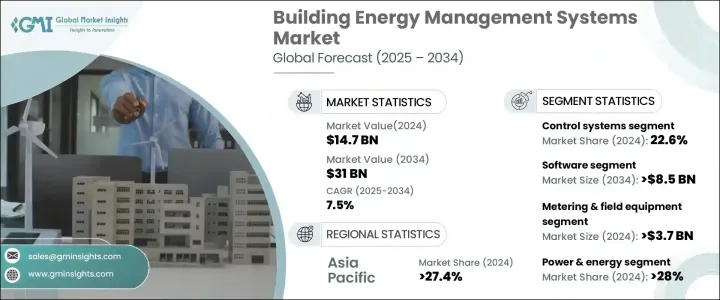PUBLISHER: Global Market Insights Inc. | PRODUCT CODE: 1699291

PUBLISHER: Global Market Insights Inc. | PRODUCT CODE: 1699291
Building Energy Management Systems Market Opportunity, Growth Drivers, Industry Trend Analysis, and Forecast 2025-2034
The Global Building Energy Management System Market reached USD 14.7 billion in 2024 and is projected to expand at a CAGR of 7.5% between 2025 and 2034. The increasing adoption of smart energy solutions, driven by stringent regulatory frameworks and a growing focus on sustainability, is fueling this expansion. Governments worldwide are implementing policies that require commercial and industrial buildings to deploy energy-efficient technologies, pushing demand for advanced energy management solutions. Rising energy consumption and the need to minimize operational costs have further incentivized businesses to invest in cutting-edge BEMS technologies.

With the integration of AI-driven analytics, IoT-enabled automation, and cloud-based energy optimization platforms, the market is witnessing rapid technological advancements. Companies are leveraging these innovations to improve energy utilization, enhance building performance, and meet aggressive sustainability goals. The increasing reliance on renewable energy sources, coupled with the growing emphasis on carbon footprint reduction, is further accelerating BEMS adoption. Additionally, the escalating energy costs and rising concerns over grid reliability are prompting businesses to implement robust energy monitoring systems to optimize electricity usage. Private sector investments in sustainable infrastructure and smart buildings are driving market growth as enterprises seek to achieve regulatory compliance while ensuring long-term energy efficiency.
| Market Scope | |
|---|---|
| Start Year | 2024 |
| Forecast Year | 2025-2034 |
| Start Value | $14.7 Billion |
| Forecast Value | $31 Billion |
| CAGR | 7.5% |
The software segment is poised for substantial expansion, with projections indicating it will generate USD 8.5 billion by 2034. Businesses are prioritizing intelligent energy monitoring and automation to streamline operations and reduce energy wastage. Advanced software solutions equipped with real-time data analytics and AI-powered automation are revolutionizing the way organizations manage their energy needs. By optimizing energy distribution and consumption patterns, these solutions enable companies to lower costs and improve overall efficiency. With industries shifting towards digital transformation, the demand for smart energy management software continues to rise, positioning it as a key driver of market growth in the coming decade.
The power and energy sector accounted for 28% of the total market share in 2024, and its influence is expected to expand significantly in the coming years. Rapid industrialization and urbanization have led to an unprecedented surge in global energy demand, increasing the need for sophisticated energy management solutions. Organizations across the power generation and distribution sectors are making strategic investments in energy-efficient technologies to optimize resource utilization and reduce carbon emissions. The growing integration of renewable energy sources, such as solar and wind power, is further contributing to the rising adoption of BEMS solutions. As companies focus on sustainable development and energy conservation, the sector remains a crucial growth area for BEMS providers worldwide.
The US building energy management system market was valued at USD 2.9 billion in 2024 and is experiencing a notable surge in adoption. The modernization of building infrastructure, coupled with the growing emphasis on energy optimization, is driving demand across commercial and residential sectors. By 2034, the North American market is expected to generate USD 7.5 billion, fueled by increasing investments in smart building technologies. Regulatory measures, including government-backed policies and energy efficiency mandates, are shaping the industry by establishing clear standards that encourage the integration of advanced energy management systems. As companies seek to enhance operational efficiency and meet sustainability targets, the shift towards intelligent building technologies is set to propel market expansion over the next decade.
Table of Contents
Chapter 1 Methodology & Scope
- 1.1 Market definitions
- 1.2 Base estimates & calculations
- 1.3 Forecast calculation
- 1.4 Data sources
- 1.4.1 Primary
- 1.4.2 Secondary
- 1.4.2.1 Paid
- 1.4.2.2 Public
Chapter 2 Executive Summary
- 2.1 Industry synopsis, 2021 - 2034
Chapter 3 Industry Insights
- 3.1 Industry ecosystem analysis
- 3.2 Regulatory landscape
- 3.3 Industry impact forces
- 3.3.1 Growth drivers
- 3.3.2 Industry pitfalls & challenges
- 3.4 Growth potential analysis
- 3.5 Porter's analysis
- 3.5.1 Bargaining power of suppliers
- 3.5.2 Bargaining power of buyers
- 3.5.3 Threat of new entrants
- 3.5.4 Threat of substitutes
- 3.6 PESTEL analysis
Chapter 4 Competitive landscape, 2024
- 4.1 Strategic dashboard
- 4.2 Innovation & sustainability landscape
Chapter 5 Market Size and Forecast, By Component, 2021 – 2034 (USD Million)
- 5.1 Key trends
- 5.2 Metering & field equipment
- 5.3 Hardware
- 5.4 Software
- 5.5 Networking device
- 5.6 Control systems
- 5.7 Sensors
- 5.8 Others
Chapter 6 Market Size and Forecast, By Application, 2021 – 2034 (USD Million)
- 6.1 Key trends
- 6.2 Power & energy
- 6.3 IT
- 6.4 Manufacturing
- 6.5 Enterprise
- 6.6 Healthcare
- 6.7 Others
Chapter 7 Market Size and Forecast, By Region, 2021 – 2034 (USD Million)
- 7.1 Key trends
- 7.2 North America
- 7.2.1 U.S.
- 7.2.2 Canada
- 7.2.3 Mexico
- 7.3 Europe
- 7.3.1 UK
- 7.3.2 France
- 7.3.3 Germany
- 7.3.4 Italy
- 7.3.5 Russia
- 7.3.6 Spain
- 7.4 Asia Pacific
- 7.4.1 China
- 7.4.2 Australia
- 7.4.3 India
- 7.4.4 Japan
- 7.4.5 South Korea
- 7.5 Middle East & Africa
- 7.5.1 Saudi Arabia
- 7.5.2 UAE
- 7.5.3 Turkey
- 7.5.4 South Africa
- 7.5.5 Egypt
- 7.6 Latin America
- 7.6.1 Brazil
- 7.6.2 Argentina
Chapter 8 Company Profiles
- 8.1 ABB
- 8.2 C3.ai
- 8.3 Dexma Sensors
- 8.4 Eaton
- 8.5 Emerson Electric
- 8.6 ENGIE Impact
- 8.7 eSight Energy
- 8.8 General Electric
- 8.9 GridPoint
- 8.10 Honeywell
- 8.11 IBM
- 8.12 Ingersoll Rand
- 8.13 Johnson Controls
- 8.14 Mitsubishi Heavy Industries
- 8.15 NX Technologies
- 8.16 Optimum Energy
- 8.17 Rockwell Automation
- 8.18 Schneider Electric
- 8.19 Siemens
- 8.20 SkyFoundry
- 8.21 Telkonet
- 8.22 Toshiba




